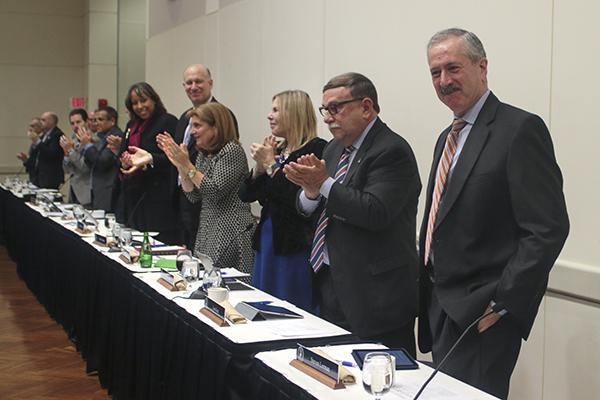Officials are rethinking GW’s leadership structure as they prepare for the chief academic officer to step down in January.
When Provost Steven Lerman arrived at GW in 2010, officials restructured the entire academics arm of the University to bring more offices under his purview and give him heightened responsibilities as the second-in-command to University President Steven Knapp. At a Faculty Senate meeting this month, Knapp said that when Lerman leaves, officials will take the opportunity to reevaluate how the provost’s office functions.
While the changes likely won’t be drastic, they could change the balance of power within the administration, and serve as chance for Knapp and an active Board of Trustees to leave a lasting mark on how the University functions. And because faculty work closely with the provost, faculty leaders said they would also like a say in any changes.
This is the first time in Knapp’s administration that permanent deans are in place in all 10 of GW’s schools – all decisions which were given a final stamp of approval by the president and provost. With handpicked leaders across the University, Knapp is presented with an opportunity to make decisions for a University administration from which he has built-in support.
“It’s time to step back and look at it to see what’s working, what’s not working. But I’m not anticipating any radical change at all,” Knapp said at the meeting. “I’m certainly not anticipating any disruptive change.”
Lerman said the decisions about the changes to the office after his departure will be up to others, like Senior Vice Provost for Academic Affairs and Planning Forrest Maltzman, who is filling in for Lerman on an interim basis.
“That’s really Maltzman’s call. There will be planned shifts before I leave,” Lerman said after Friday’s Board of Trustees meeting. “Ultimately, it’s in his hands.”
Maltzman said conversations are going on to figure out what could be changed, but he’s concentrating on how best to manage the day-to-day aspects of the office.
Charles Garris, the chair of the Faculty Senate’s executive committee, said faculty hope to have a large role in helping to determine these next changes, a desire echoed by other faculty members.
He said he and other leaders of a top Faculty Senate committee have met with Lerman multiple times to discuss the transition and the possible changes in who they report to, and will meet with Maltzman over the next couple of weeks.
“We’re probably going to be looking at trying to encourage interdisciplinary work and trying to figure out ways to have degrees that are options for people where they can utilize the experience and the know-how of various schools,” Garris said. “Part of the problem with GW is we’ve always had that capability, but the incentives weren’t there.”
Garris, who has spent three decades at GW as an engineering professor, said any changes will be propelled forward by the Board of Trustees, which he said is “very proactive” compared to past boards. The Board of Trustees meets several times a year and is in charge of GW’s strategic vision: setting fundraising priorities, helping to select top leaders and signing off on changes like introducing new degrees.
“One of the things that’s happened there is that we have a sort of transformational Board of Trustees now, you know, very different than what we ever had before,” Garris said.
Philip Wirtz, a professor of decision sciences and psychology who asked Knapp about the possible restructuring at the Faculty Senate meeting, said in an email that he was afraid that potential changes to the administration could dramatically change the priorities of the University.

Wirtz, who served on the search committees for both Knapp and Lerman, said he and other members of the Faculty Senate advocated during Knapp’s first restructure that Lerman be the sole No. 2 at the University, rather than two top officials – one for academics and one for finances – independently reporting to Knapp. He said he’s afraid there’s a possibility that GW would reconsider the option of the two separate officials, an idea that Knapp has said is unlikely to happen.
“My interpretation of his comments left the door open to this possibility, to which my follow-up point to him was that it was our expectation in the senate that if any such thing was being contemplated, the senate should be engaged in the dialog well before any decision was made,” Wirtz said in an email. “I believe that he heard that message – based on my post-meeting discussions, everyone else in the room did.”
Knapp also said at the Faculty Senate meeting that he recently had a meeting with all of the deans and vice presidents of the University to figure out ways to be more efficient and make their lives easier. Knapp said the officials discussed problems they have had in areas like information technology and other bureaucratic issues that could delay progress at GW.
“That really is about making our processes more efficient because we try to identify more bureaucratic obstacles and I think the way you do that is you get people together in a working group and you say, ‘What can we do to make things work better?’ And then you go after that,” Knapp said.
Jay Dee, an associate professor and the director of the higher education doctoral program at the University of Massachusetts Boston, said it’s not uncommon for these kinds of changes to happen when leaders leave an institution, and can be easier to make than when a permanent leader is in place.
“It’s easier to restructure when you have some interim leaders. In those instances, the structures are a little more flexible,” Dee said. “People are more open to those changes than when you have a permanent administrator in place – that new administrator is going to protect the turf, so to speak.”







